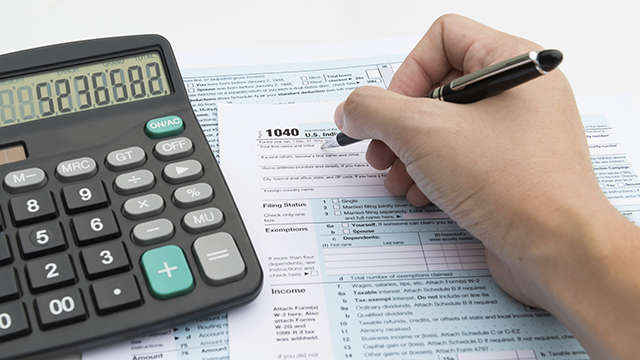tax preparation
Types of Tax Return Pros
You can have anyone—your uncle, your neighbor, or your best friend—prepare your tax return. But if you’re paying for this service, the person must be registered with the IRS and have a current preparer tax identification number (PTIN), which is an IRS number issued annually to eligible preparers.
What Will You Pay?
The more credentialed the person who prepares your return is, the more you can expect to pay. As a general rule, you’ll pay the highest fees to attorneys, followed by CPAs and then enrolled agents. The lowest fees are charged by annual filing season program participants and preparers without any special designation.
Who’s Best for What?
Cost is only one factor in choosing a preparer. Depending on your situation, certain other considerations may be important. That includes whether you might want the preparer to represent you if the IRS raises any questions concerning your return. These are some general guidelines, for each type of preparer.
Red Flags to Watch For
Once you’ve decided what type of preparer to use, make sure you steer clear of anyone who may be unscrupulous or could create problems for you. (If the IRS suspects that a preparer’s actions are shady, their clients’ returns may be subject to special review.) Some tipoffs of suspicious behavior.
Some Final Advice
To make the best use of your preparer’s time—and keep your bill to a minimum—be sure to gather all the information you need and make a list of your questions before you meet.

How To Get Your Money’s Worth and Choose The Right Tax Preparer
Free File through the IRS – Anyone can use free file and e-file their federal tax return at no cost. This is due to a public-private partnership between the IRS and tax preparation software companies called Free File Alliance. You can simply fill out the forms online and e-file. For example, this would have been perfect when I helped my mother-in-law with her simple tax return; she only had income from Social Security and some investment income. That was it. Free e-file is a perfect fit for very simple returns.
Do-it-yourself with tax preparation software – Tax software programs are popular for a reason: they are easy to use. The program walks you through every section of your return, highlights deductions you might not have caught, provides red flag audit alerts and to top it off are inexpensive. Three popular tax software programs are TurboTax, H&R Block at home, and TaxAct. They range from $10 (Tax Act) to $45 (H&R Block at home) for the deluxe home version.
Use a storefront tax service – People with relatively basic returns who don’t want to do it themselves may want to consider a storefront tax service. The tax code is complex and constantly changing. In fact in April 2011, IRS Commissioner Douglas Shulman reported that there had been about 3,500 tax changes since 2000, and that doesn’t even include the latest changes in the fiscal cliff negotiations. It makes sense that most people want face-to-face help where they can get their questions answered and receive personalized guidance from a tax preparer.
Getting help with an Enrolled Agent – The IRS does not currently have any guidelines on who can prepare your tax return (although some states such as California do). This makes it a challenge to find out if someone is competent with even basic tax preparation. Instead of just choosing any tax preparer, consider working with an Enrolled Agent. According to the National Association of Enrolled Agents, they are required to demonstrate competency in all areas of taxation, representation and ethics before they are given unlimited representation rights before the IRS. An Enrolled Agent is a tax specialist for people who are looking specifically for tax return preparation, tax advice, and audit representation.
Hiring a Certified Public Accountant – As mentioned in a previous blog, the services of a Certified Public Accountant may be somewhat more expensive, but in many cases well worth the money spent. People who need strategic tax planning such as small business owners or individuals with complex returns, those who pay high income taxes, or have unusual circumstances appreciate the services of a CPA over an enrolled agent or general tax preparer. You would think that filing your taxes would be very black and white, but where CPAs really provide value is in grey areas. They give advice on which tax strategies to take or not to take based on their interpretation of IRS rulings and past experience.
Questions To Ask When Choosing A Tax Preparer
How do you determine your fees? Note the wording on this one. I didn’t say ask how much the fees would be but how the fees are determined. Prices may vary based on the complexity of your return, whether you require additional schedules (such as dividend and interest on Schedule B, business information on Schedule C, capital gains and losses on Schedule D and/or rental income and losses on Schedule E); supporting forms (such as those for the child tax credit or additional charitable donation information); or whether your return has out of the ordinary line items (like Roth IRA conversions). Some preparers offer reduced costs for federal return but add on for state and local returns: make sure you understand the total cost. Finally, be wary of preparers who base their fee on a percentage of your anticipated refund: they have a financial incentive to encourage inappropriate credits and deductions.
What about the extras? There’s nothing wrong with paying for the extras: just make sure that you know what those might be ahead of time. When asking about fees (see #6), be sure to ask about the cost of extra services, like the cost to fix any mistakes or to file electronically (see #7). A tax preparer should not charge you extra for a copy of your return when the return is prepared (though charging you extra for additional copies may be appropriate).
Can I file electronically? More than 1 billion individual tax returns have been processed since the debut of electronic filing in 1990. It’s the fastest way to get your refund and tends to result in fewer math errors. It may also be required: a paid preparer who prepares and files more than ten client returns must generally file returns electronically unless the client opts out.
Who will sign my return? Remember that your preparer must have a PTIN (see again #1). The PTIN and the preparer’s signature need to appear on your tax return. Don’t trust a preparer who refuses to sign a return or asks you to sign as self-prepared.
When will I receive a copy of my return? It’s not unreasonable to leave your preparer’s office without a copy of your completed return; assembly may be required. However, you should receive a complete copy of your return within a reasonable amount of time following your appointment. If your preparer can’t offer a window of time to expect the copy, it might be indicative of a time management problem. If your preparer can’t promise you a copy at all, run, don’t walk away: you will need a copy for your own records.
How to Choose a Tax Preparer
- Review the tax preparer’s credentials. EAs, CPAs, and tax attorneys are all qualified to represent their clients to the IRS on all matters. Other preparers can help you with forms and basic matters, but cannot represent you in case of an audit. Don’t be afraid to ask about these or other qualifications before you hire someone.
- Be wary of spectacular promises. If a tax preparer promises you larger refunds than the competition, this is a red flag. Many such tax preparers base their fees on the amount of your return and may be likely to use shady tax preparation tactics. In addition, it’s wise to avoid tax preparers who offer “refund anticipation loans” as you’ll probably lose a large percentage of your return to commission fees.
- Get referrals from friends and family. One of the best ways to find a trustworthy tax preparer is to ask your loved ones for recommendations. Once you have a few options, check the BBB.org, paying careful attention to other consumers’ reviews or complaint details. This will give you a clear view about what you can expect.
- Think about availability. If the IRS finds errors in your tax forms or decides to perform an audit, will your tax preparer be available to help you with the details? Find out whether you can contact the tax preparer all year long or only during tax season.
- Ask about fees ahead of time. Before you agree to any services, read contracts carefully and understand how much the tax preparer charges for their services. Ask about extra fees for e-filing state, federal, and local returns, as well as fees for any unexpected complications.
- If things don’t add up, find someone else. If a tax preparer can’t verify their credentials, has a record of bad reviews from previous clients, or their business practices don’t seem convincing, don’t do business with them. Keep in mind that if you hire them, this individual will handle your sensitive personal information – information you need to keep safe from corrupt or fraudulent tax preparers.

Checklist for Selecting the Best Accountant
Check the Preparer’s Qualifications. Use the IRS Directory of Federal Tax Return Preparers with Credentials and Select Qualifications. This tool helps taxpayers find a tax return preparer with the qualifications that they prefer. The Directory is a searchable and sortable listing of preparers with a credentials or filing season qualifications.
Check the Preparer’s History. Ask the Better Business Bureau about the preparer. Check for disciplinary actions and the license status for credentialed preparers. For CPAs, check with the State Board of Accountancy. For attorneys, check with the State Bar Association. For Enrolled Agents, go to IRS.gov and search for “verify enrolled agent status” or check the Directory.
Ask about Service Fees. Avoid preparers who base fees on a percentage of the refund or who boast bigger refunds than their competition. When inquiring about a preparer’s services and fees, don’t give them tax documents, Social Security numbers and other information. Some preparers have improperly used this information to file returns without the taxpayer’s permission.
Ask to e-file. Taxpayers should make sure their preparer offers IRS e-file. Paid preparers who do taxes for more than 10 clients generally must file electronically. The IRS has safely processed billions of e-filed tax returns
Make Sure the Preparer is Available. Taxpayers may want to contact their preparer after this year’s April 18 due date. Avoid fly-by-night preparers.

Recent Comments